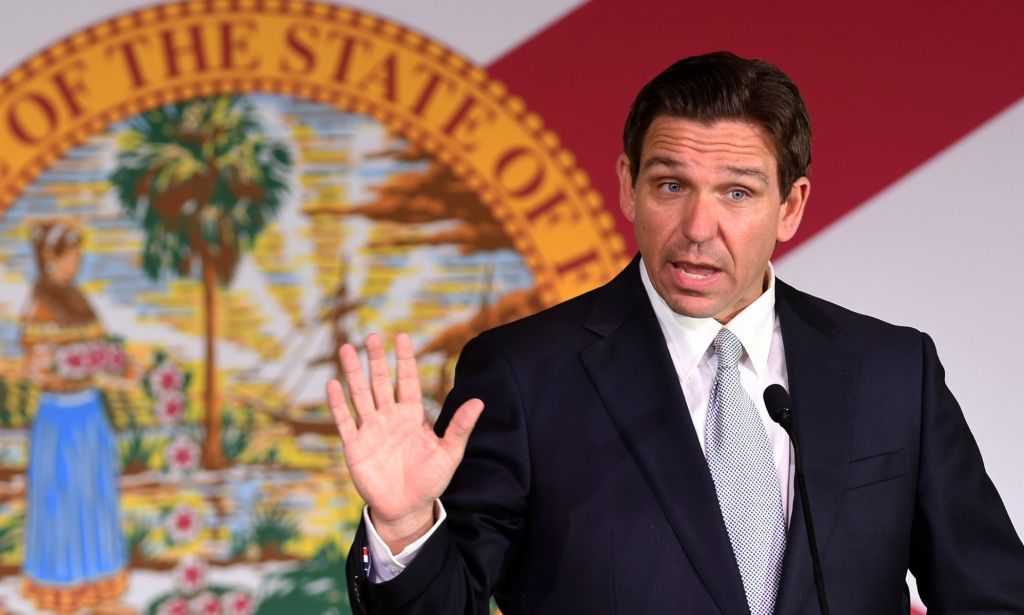‘Horrifying’ Republican 2024 race could be catastrophic for young LGBTQ+ Americans, activists say

Nikki Haley, Donald Trump and Ron DeSantis are among the crowded field of Republican 2024 candidates. (Getty)
With alarming speed, anti-trans rhetoric has become a defining factor in the Republican race towards the 2024 presidential election – and it has activists concerned that ‘blood thirsty’ and ‘extreme’ bases will hurt an already vulnerable community.
The Republican party and conservative media have made it clear that the lives of trans people and the broader LGBTQ+ community will continue to be weaponised for the forseeable future, with 17 months remaining until the 2024 election.
This blatant prejudice has been abundant as the field of Republican presidential candidates grapples for the party nomination. The first couple months of the race saw Donald Trump and his vice president Mike Pence take swipes at gender-affirming healthcare for trans youth while Ron DeSantis continues to rage against the proliferation of ‘wokeness’ in the US.
Ari Drennen, LGBTQ+ programme director for Media Matters for America, says that so far, the race has been “pretty horrifying”.
She notes that ahead of the 2022 midterms, trans rights were a “dominant campaign issue”. The election returned a “historic underperformance for the Republicans”, which should have been enough to change their tactics.
“Republicans should have had an opening,” Drennen says. “Biden has a pretty low approval rating. The economic situation in the United States has been quite difficult for the last couple of years.
“The Republican effort to focus the [2022] election around trans issues backfired spectacularly. To have that context, then for them to go into the 2024 election cycle continuing to talk about this all the time, I think just demonstrates how radicalised and out of touch the right-wing base is.”
Josie Caballero, a director at the National Center for Transgender Equality, notes that most americans support trans rights – but that Republicans appear to be “really appealing to that radical base”.
“Even though most of the country actually says trans people should have the right to exist, they are still going after trans people because they know that it’s appealing to the most extreme portions of their base who are going to be the largest activists for their cause, especially during the primary election process,” Caballero says.

Drennen says those activists who will “ultimately will be making their voices heard throughout the primary process are people who are glued to Fox News; they’re glued to Matt Walsh and the Daily Wire and Charlie Kirk.”
“So they’ve expected a similar level of blood thirst from the politicians that they’re considering supporting that they hear every day on YouTube, Spotify, Twitter.”
When trying to bolster his third presidential election campaign, Trump tried to drum up support by threatening a federal rollback of trans rights and attacking gender-affirming healthcare for trans youth.
DeSantis, Trump’s top rival, is no stranger to attacking the trans community. When announcing his presidential campaign, the Florida governor whined about the “woke mob” and complained that schools are “jamming gender ideology” into education.
Pence launched his bid by denouncing life-saving healthcare for trans youth. Nikki Haley, a long-shot candidate in the 2024 Republican presidential race, falsely claimed the presence of trans girls in locker rooms is connected to a rise in suicidal thought among teen girls in the US during a CNN town hall event.
There are real-world implications to the proliferation of anti-trans hate pushed by Republicans
Caballero explains that there’s real-world effects to promoting such hate.
“What we’re seeing is an uptick in mental health crises across the United States, especially with young people in the states that are extremely aggressive with their lawmakers and things of that nature,” she says.
“But to go even further, the fact is you have a major political party that is using their primary platform to go after the most marginalised, vulnerable Americans in the United States to basically try to push their political agenda to appease a very extreme, radical portion of this country.”

In the first six months of 2023, over 500 anti-LGBTQ+ bills have been introduced in statehouses across the country. Many attack the rights of trans and non-binary people including gender-affirming healthcare restrictions, trans bathroom bans and sports bans.
Nearly one in three queer youth said their mental health was poor most of the time or always due to this surging anti-LGBTQ+ legislation, according to The Trevor Project’s 2023 US National Survey on the Mental Health of LGBTQ Young People.
The LGBTQ+ youth suicide prevention organisation’s survey also found 41 per cent of queer youth seriously considered attempting suicide in the past year. Looking at the data further, this broke down to half of trans and non-binary respondents to the survey.
Casey Pick, director of law and policy at The Trevor Project, says these young people aren’t “inherently prone to suicide risk because of their identities”, but are “placed at higher risk because of how they are mistreated and stigmatised in society”.
“The Trevor Project’s crisis counsellors have heard from LGBTQ young people who express that these dangerous policies – and the equally dangerous anti-trans rhetoric that surrounds them – cause them to feel stressed and scared,” she says.
“To be blunt, it takes a lot for a teenager to call out state legislation by bill number, but we’ve seen it happen this session.

“It is imperative that all politicians, regardless of their political affiliation, understand that these policies aren’t just about politics.
“They are taking a real and devastating toll on the health and well-being of LGBTQ young people.”
Anti-LGBTQ+ hate has been a rallying cry for queer people and allies to fight back against Trump and DeSantis.
Albert Fujii, press secretary at LGBTQ+ Victory Fund and LGBTQ+ Victory Institute, agrees that politicians aren’t “appreciating the fact that their words matter”, especially for queer kids who see “folks trying to demonise them”.
Fujii says the hate politicians are “spewing on the campaign trail” also serves as a “rallying cry for bigots” to attack queer folks.

At the same time, it has also been “firing up our community and allies” to fight back against DeSantis and Trump as well as support LGBTQ+ elected officials, he says.
“We’re seeing our community come together and be more unified than ever,” Fujii says. “You know realising that an anti-LGBTQ+ bill in Montana impacts everyone in the US, not just people who live in Montana, or an attack against a LGBTQ+ lawmaker in Texas impacts all of us.”
“So I think that silver living is that a lot of our community has been really coming together. It’s also been really important to now start seeing pro-LGBTQ+ laws introduced.
“Defence really just isn’t cutting it, and so lawmakers and states like Colorado, Connecticut and California have been introducing pro-LGBTQ+ laws.”
Fujii says that having more LGBTQ+ elected officials is vital because it “totally changes the conversation because now an anti-LGBTQ+ is about [how] it will impact a lawmaker’s colleague”.
When there are multiple queer voices, this power “just gets strengthened so much more”, he adds.
How did this story make you feel?

